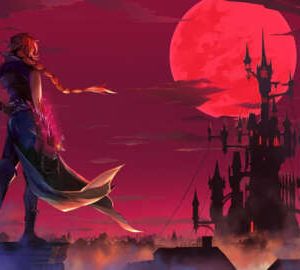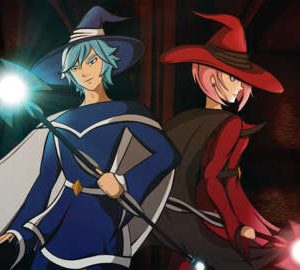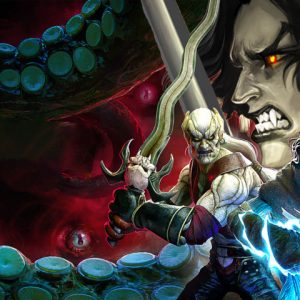To all of my fellow members of the LGBTQ+ community, happy Pride. Being queer these days is a whirlwind of emotions, some very positive and hopeful, and others not so much. Our history is one of courage and struggle, a struggle that continues today. And in this fight, it’s essential to learn from the experiences of our queer elders, both to learn what has changed, and what work remains. One such elder is legendary game designer Tim Cain, who has recently published a video discussing his many years in the game industry as a gay man, and his journey from closeted life to being out to the world.
Perhaps best known as the creator of the original Fallout games in the 1990s, Tim Cain has had a storied career in the games industry. He was the project lead on PC RPGs Arcanum: Of Steamworks and Magick Obscura and The Temple of Elemental Evil, and a programmer for Vampire: The Masquerade – Bloodlines in the 2000s, as well as a senior programmer on Pillars of Eternity and Tyranny in the 2010s and, most recently, co-director on The Outer Worlds. Though he knew from a young age that he was gay, Cain stayed in the closet for many years, only coming out in the 2000s after The Temple of Elemental Evil. In a recent YouTube video, he documented that journey from closeted to visible.
In his video, Cain explores many moments of uncertainty and struggle in his life as a gay man, starting with how difficult it was to be a gay man in the ‘80s during the worst days of the AIDS crisis and how the doom and gloom of the media’s reporting at the time created an environment of silencing fear.
Perhaps one of the saddest, toughest moments he recounts is an anecdote of a friend-of-a-friend in college who, after being cut off from financial support from his family after coming out to his father, had to drop out of school, ending his PHD-bound studies. Sadly, Cain and his friend lost touch with this person after he left university.
I’ve never before seen a more absolutely dejected and demoralized person. This is a person who weeks before [was] super happy, super devoted to his studies, was going to get a PHD in social ecology and go out and do good, and no he had no idea what he was going to do with his life and I don’t know what happened to him [we] lost touch with him. We don’t know where he went so that kind of reinforced to me, “okay, nothing’s safe.”
It’s a painful reminder of what many of us fear will be the cost of admitting who we truly are, the lack of freedom to live our own lives and the risk of being cut off by people who provide us with critical support.
Cain goes on to discuss the struggles of working in environments where homophobia and transphobia were freer to go unchecked, recounting a story of a trans woman colleague at Interplay in the mid-‘90s whom senior staff openly complained about and misgendered.
These kinds of struggles, of course, are still the reality for many of us today. And they’re tough to sit with, but an essential reminder of what we’re fighting for.
Cain does reflect on how things have improved over time. After he’d come out, the president of NCSoft said to him, “Do you have any trouble with homophobia here? Because if you do, just call me. We don’t put up with that.”
Cain goes on to describe Obsidian as one of the most inclusive places he’s ever worked, only ever having an issue when the Red Cross would show up for blood drives and upon being invited to donate, Cain would have to remind them that he was gay, and thus was not allowed to. (Outdated laws made it illegal until only very recently for gay men and certain other LGBTQ people to donate blood in the United States.)
“Despite the political circus,” Cain says in the video, “things are a lot better than they were, especially in the ‘80s and ‘90s.”
I know a lot of LGBTQIA+ people in the [gaming] industry. They’re well received in their teams. They bring a lot of interesting experiences. We get a lot more interesting characters in games. And everything’s better. Nothing’s worse because of this. And I like that. And I think people kind of need to hear that.
While it is encouraging to hear positive stories of growth and change in the world, right now things are still very scary for those of us who are queer, particularly trans people.
This year alone has seen rampant transphobic laws pass in many states that not only prohibit trans youth from accessing safe, medically necessary treatments, there have also been attempts and successful attempts to restrict care for trans adults. Florida is leading the way with the passing of SB254, which strips nurse practitioners of the ability to prescribe gender-affirming care, which in one fell swoop cut off 80 percent of the state’s trans population from the medical care they’d been receiving. Florida, incidentally, has the second-highest number of transgender adults in the United States.
It’s a terrifying time, so hearing from LGBT elders like Tim Cain, I think, is especially important this month. Simply seeing others who are out, proud, and living a good life gives us the opportunity to reflect on what might be possible for ourselves. Cain’s story reveals that it’s never been easy, but that societal growth and progress can and does occur. Like Dr. Rachel Levine, I’m choosing to avoid despair and believe that things can get better.























